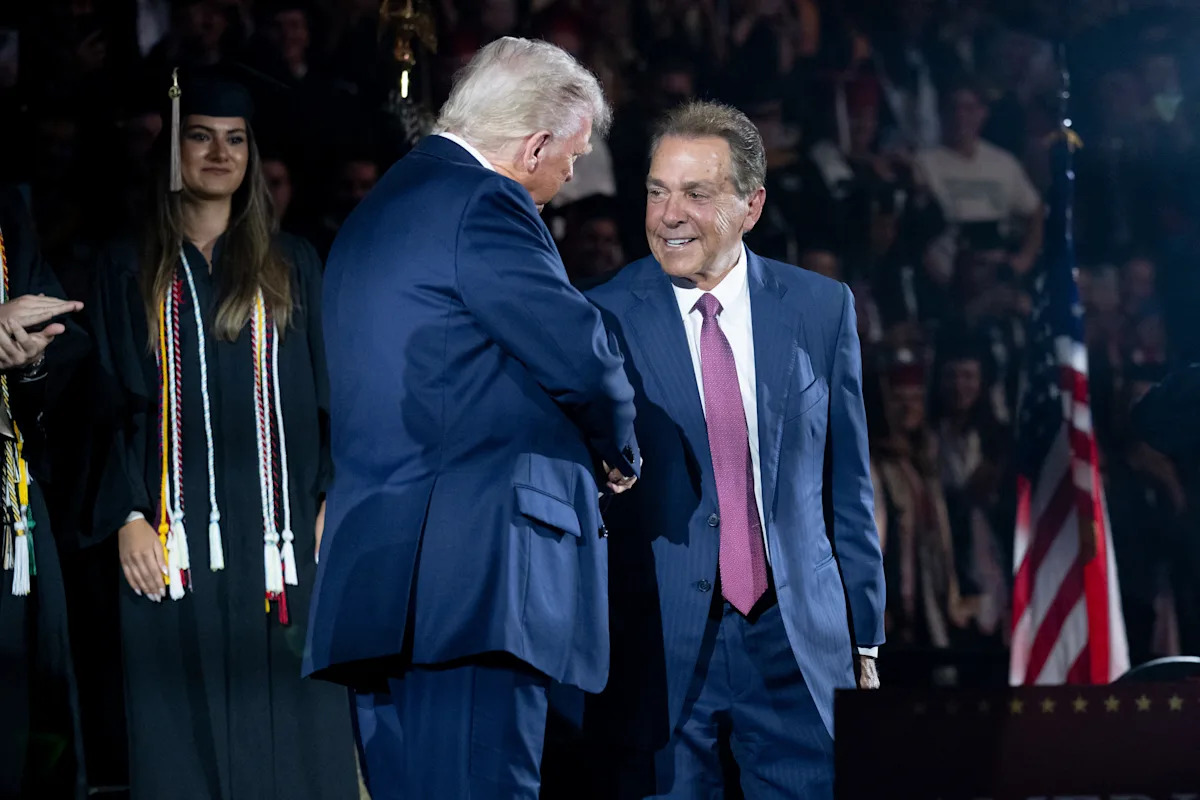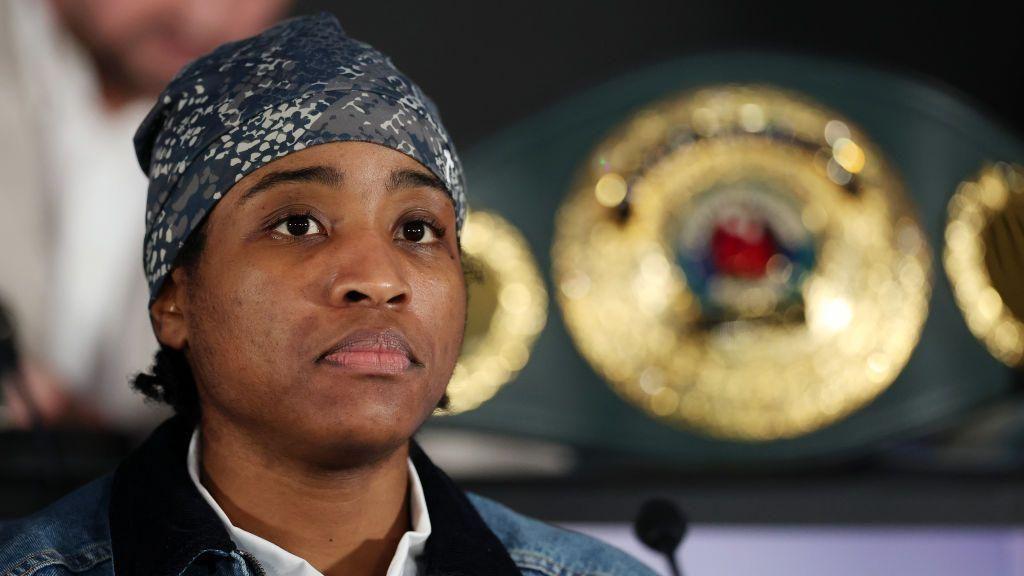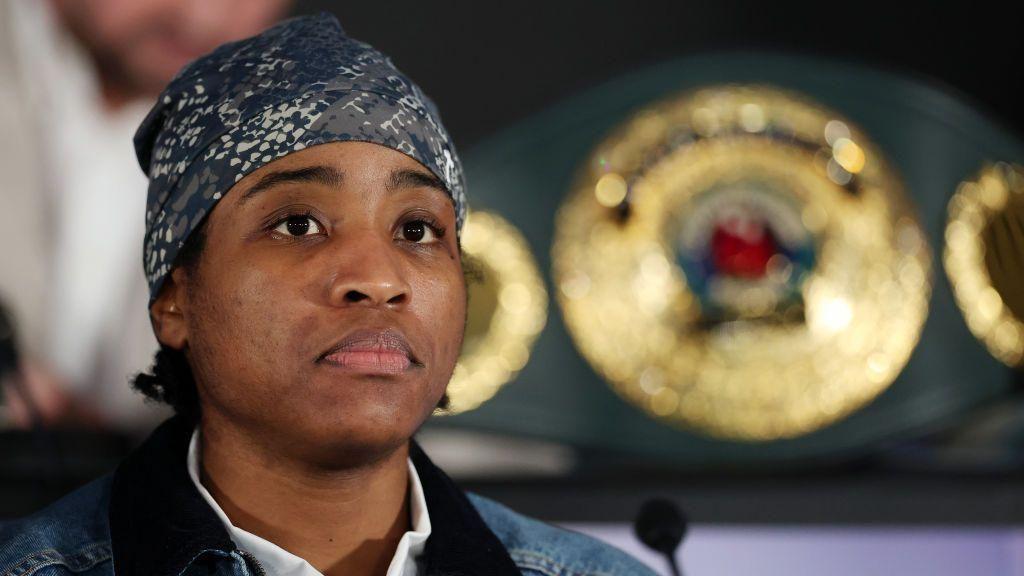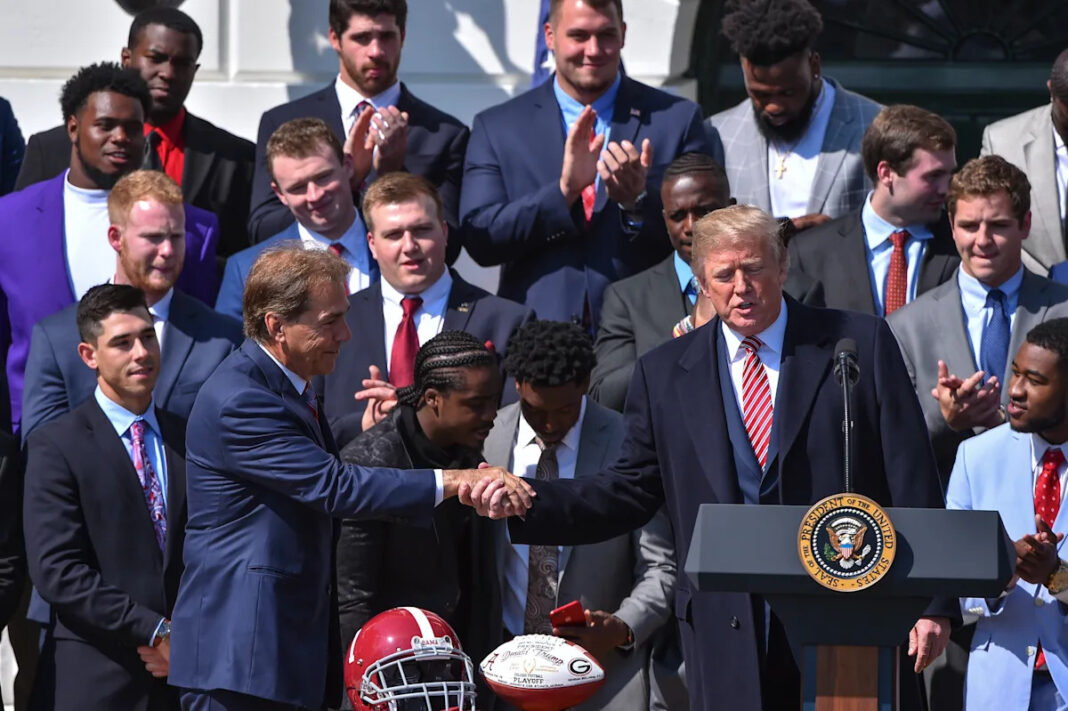A storm is brewing in the hallowed halls of collegiate athletics. Whispers of discontent have echoed for years, growing into a roar demanding change. Now, word on the street is that President Trump, with a stroke of his pen, is poised to shake the foundations of the industry. Sources reveal he’s assembling a high-powered commission to tackle the issues plaguing college sports – a commission led by none other than the legendary Nick Saban.

A Presidential Pivot & The Commission’s Mandate
Trump’s History with College Sports

President Donald Trump’s involvement in college sports is not a new phenomenon. Over the years, he has demonstrated a strong interest in the industry, often using his platform to advocate for changes and reforms. One notable example is his visit to the University of Alabama in May, where he gave a graduation address and met with former Alabama coach Nick Saban to discuss college sports legislation. This meeting has now transformed into plans for a presidential commission on college athletics, which will be led by Saban.
Trump’s history with college sports dates back to his presidential campaign, when he frequently touted his love for football and his desire to support the sport. He has also been known to attend high-profile college football games, including Alabama’s matchup against Auburn. These interactions have allowed him to build relationships with key stakeholders in the industry, including coaches, administrators, and lawmakers.
Trump’s interest in college sports is driven by his desire to create change and promote reform. He has publicly criticized the NCAA’s rules and regulations, which he believes hinder the ability of athletes to profit from their name, image, and likeness. He has also advocated for increased funding for college athletics programs and has pledged to support policies that benefit student-athletes.

The Genesis of the Commission
The idea of a presidential commission on college athletics gained momentum last month, when more than 100 college sports leaders traveled to Washington, D.C. to lobby on Capitol Hill. During this visit, they were informed of the White House’s interest in forming a commission and potential action. Last week, Sen. Tommy Tuberville suggested that Trump was contemplating an executive order, which was later confirmed by the Wall Street Journal.
The commission’s formation is a response to the growing concerns within the college sports industry. The industry is facing numerous challenges, including the frequency of player movement in the transfer portal, unregulated booster compensation paid to athletes, and the debate over college athlete employment. The commission aims to address these issues and provide recommendations for reform.
The commission is expected to be led by Nick Saban, a prominent figure in the college sports world. Saban has a strong track record of success as a coach and has been a vocal advocate for changes in the industry. He has built relationships with key stakeholders, including lawmakers and business leaders, which will be essential in driving the commission’s work.
Saban’s Strategic Influence
Saban’s Leadership Style
Nick Saban is known for his strategic leadership style, which has been instrumental in his success as a coach. He is a master of adapting to changing circumstances and has a talent for building strong relationships with his players, coaches, and administrators. These skills will be essential in leading the presidential commission on college athletics.
Saban’s background in football has given him a unique understanding of the industry, including its challenges and opportunities. He has a deep understanding of the NCAA’s rules and regulations and has been a vocal advocate for changes that benefit student-athletes. This expertise will be invaluable in driving the commission’s work and providing recommendations for reform.
Saban’s ability to build relationships with key stakeholders will be critical in driving the commission’s work. He has a proven track record of building strong relationships with lawmakers, business leaders, and other stakeholders in the industry. This will allow him to navigate the complex landscape of college sports and identify opportunities for reform.
Saban’s Influence on College Sports
Nick Saban’s influence on college sports extends beyond his coaching career. He has been a vocal advocate for changes in the industry, including the implementation of rules that benefit student-athletes. He has also been a strong supporter of the name, image, and likeness (NIL) movement, which has aimed to give athletes more control over their own brand and image.
Saban’s influence on college sports is driven by his desire to create change and promote reform. He believes that the industry needs to adapt to the changing landscape of college athletics and provide more opportunities for student-athletes. He has been a vocal critic of the NCAA’s rules and regulations, which he believes hinder the ability of athletes to profit from their name, image, and likeness.
Saban’s influence on college sports will be felt through the presidential commission on college athletics. He will provide leadership and guidance to the commission, helping to drive its work and provide recommendations for reform. His expertise and experience will be invaluable in shaping the future of college sports.
The Commission’s Objectives
Addressing the Challenges in College Sports
The presidential commission on college athletics will address the growing challenges within the industry. The commission will examine the frequency of player movement in the transfer portal, unregulated booster compensation paid to athletes, and the debate over college athlete employment. It will also explore the application of Title IX to school revenue-share payments and the preservation of the Olympic sport structure.
The commission’s objectives are driven by the need for reform in the college sports industry. The industry is facing numerous challenges, including the changing landscape of college athletics, the growing concerns over player safety, and the need for increased funding for college athletics programs. The commission aims to provide recommendations for reform that will address these challenges and promote a healthier and more sustainable industry.
The commission’s work will be driven by a combination of research, analysis, and stakeholder engagement. It will examine existing data and research, consult with experts in the field, and engage with key stakeholders, including lawmakers, business leaders, and student-athletes. This will provide a comprehensive understanding of the challenges facing the industry and inform the commission’s recommendations for reform.
Regulating NIL and Athlete Compensation
The commission will examine the current state of name, image, and likeness (NIL) regulations in college sports. It will explore the impact of the NIL movement on student-athletes and the industry as a whole. The commission will also examine the debate over college athlete employment, including the potential for athletes to earn compensation for their work.
The commission’s recommendations for regulating NIL and athlete compensation will be driven by a desire to create a more equitable and sustainable industry. It will aim to provide student-athletes with more control over their own brand and image, while also promoting a level playing field for all participants in the industry.
The commission’s recommendations will be informed by a combination of research, analysis, and stakeholder engagement. It will examine existing data and research, consult with experts in the field, and engage with key stakeholders, including lawmakers, business leaders, and student-athletes. This will provide a comprehensive understanding of the challenges facing the industry and inform the commission’s recommendations for reform.
Conclusion
The presidential commission on college athletics will play a critical role in shaping the future of the industry. Led by Nick Saban, the commission will examine the growing challenges facing the industry and provide recommendations for reform. Its work will be driven by a combination of research, analysis, and stakeholder engagement, and its recommendations will be informed by a desire to create a more equitable and sustainable industry.
The commission’s objectives are clear: to address the challenges facing the industry, regulate NIL and athlete compensation, and promote a healthier and more sustainable industry. Its work will be critical in shaping the future of college sports and providing opportunities for student-athletes to succeed.
The commission’s success will depend on its ability to engage with key stakeholders, including lawmakers, business leaders, and student-athletes. It will need to build strong relationships with these stakeholders and provide a clear and compelling vision for the future of the industry. By doing so, the commission can help to create a more equitable and sustainable industry that benefits all participants.
Saban’s Advocacy
Nick Saban, the former Alabama coach, has been an outspoken advocate for reform in the college sports industry. His public stance on issues like player rights and name, image, and likeness (NIL) has resonated with many. Saban’s influence on the legislative landscape have been significant, and his vision for the future of college sports is likely to align with the broader goals of the NCAA and its stakeholders.
As a central figure in the fight for college sports legislation, Saban is expected to be integral to the commission’s work. During Trump’s visit to Tuscaloosa last week to give a graduation address at the University of Alabama, Trump and Saban met about college sports legislation – a meeting that has now transformed into plans for this executive group to be formed.
A Power Play
Nick Saban’s relationships with political figures are well-documented. His ability to leverage these connections for change is unparalleled. His ties to figures like Sen. Ted Cruz and his interactions with Joe Manchin demonstrate his ability to navigate the complex world of politics.
As a master strategist, Saban knows exactly how to get things done. His ability to pivot his entire philosophy from a run-first defensive suffocation to an air-it-out swarm during his tenure at Alabama is a testament to his adaptability. The result? Another three national championships, Heismans for quarterback Bryce Young and wide receiver DeVonta Smith, and four – and counting – starting quarterbacks in the NFL.
The Czar of College Football
The idea of Saban running the famously headless, leaderless sport of college football isn’t a new one. No less than the Oracle of the SEC has advocated for Saban to claim the throne. “I think the solution to college football is you need to quit wasting time being on TV and you need to be what everybody in my business has suggested,” Paul Finebaum told Saban at an event last May. “You need to be the czar of college football. If you agree to that right now, we can solve a lot of problems.”
Saban demurred at the time, but it’s clear he’s keeping a close eye on the direction of the sport. At a public forum last May with Sen. Ted Cruz, Saban called for “rules that create a level playing field” and advocated for “athletes’ rights to control their own names, images, and likenesses.
Implications and Challenges for the Future of College Sports
Navigating the Uncharted Territory
The potential impact of the commission on existing power structures and the future governance of college sports is significant. The commission is expected to deeply examine the unwieldy landscape of college sports, including the frequency of player movement in the transfer portal, the unregulated booster compensation paid to athletes, the debate of college athlete employment, preserving the Olympic sport structure, the application of Title IX to school revenue-share payments and, even, conference membership makeup and conference television contracts.
The implications of this examination are far-reaching and will likely have a profound impact on the future of college sports.
Facing Opposition
The commission is likely to face opposition from various stakeholders, including conferences, universities, players, and advocacy groups. The commission must address these concerns and develop a plan that takes into account the diverse interests of all stakeholders.
The key to successful implementation will be the ability of the commission to navigate these complex interests and develop a plan that is fair and equitable for all parties involved.
The Long Road Ahead
The road to meaningful change in college sports is long and complex. The commission will need to navigate the complexities of enacting change within a deeply entrenched system. The steps necessary for successful implementation will require careful planning, coordination, and cooperation from all stakeholders.
The future of college sports hangs in the balance. The commission, led by Saban, has a tall task ahead of it. But with careful planning, coordination, and cooperation, the possibilities for meaningful change are endless.
Conclusion
In conclusion, the establishment of a presidential commission on college sports, led by the esteemed coach Nick Saban, marks a significant turning point in addressing the myriad issues plaguing the industry. As discussed, the commission will tackle pressing matters such as player compensation, recruiting practices, and conference realignment, all of which have far-reaching implications for the very fabric of college sports landscape. The formation of this commission is a testament to the growing acknowledgement that the current state of affairs is unsustainable, and that concerted effort is necessary to restore balance and fairness.
The significance of this development cannot be overstated. The college sports industry is a multibillion-dollar behemoths that touches the lives of millions, from athletes to fans, and has far-reaching economic and social implications. By tackling the root causes of the industry’s ailments, this commission has the potential to bring about a sea change in the way college sports are governed, operated, and perceived. As the commission begins its work, the eyes of the nation will be fixed on its progress, and the anticipation is palpable.
Ultimately, the success of this commission will depend on its ability to strike a delicate balance between the competing interests of various stakeholders. As the fate of college sports hangs in the balance, one thing is clear: the time for meaningful change is now. Will this commission be the catalyst for a brighter, more equitable future for college sports, or will it succumb to the entrenched interests that have long stifled progress? The answer, much like the future of college sports itself, remains to be written.
